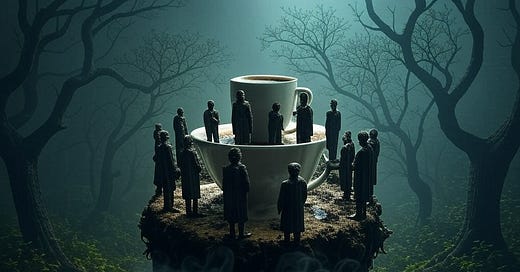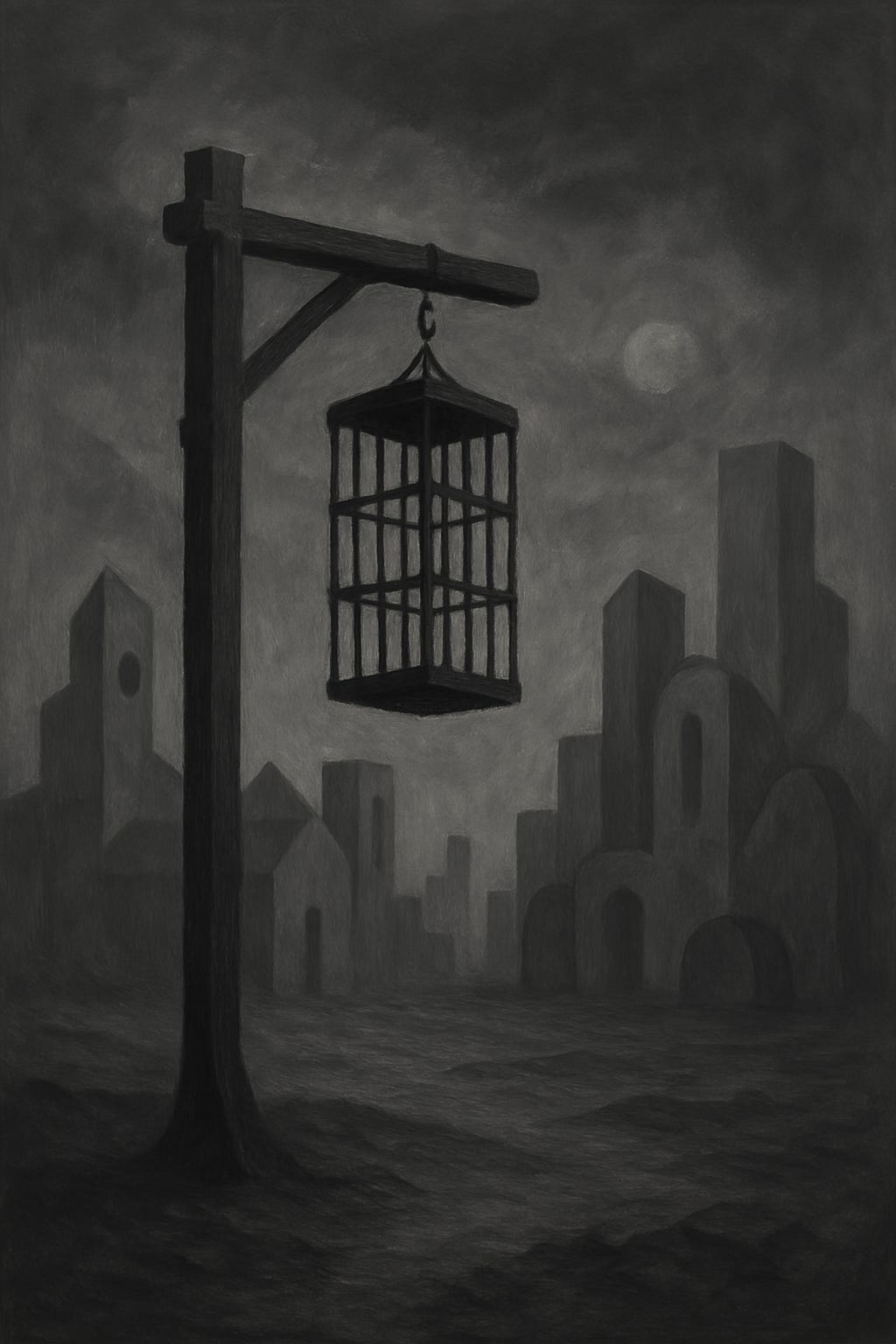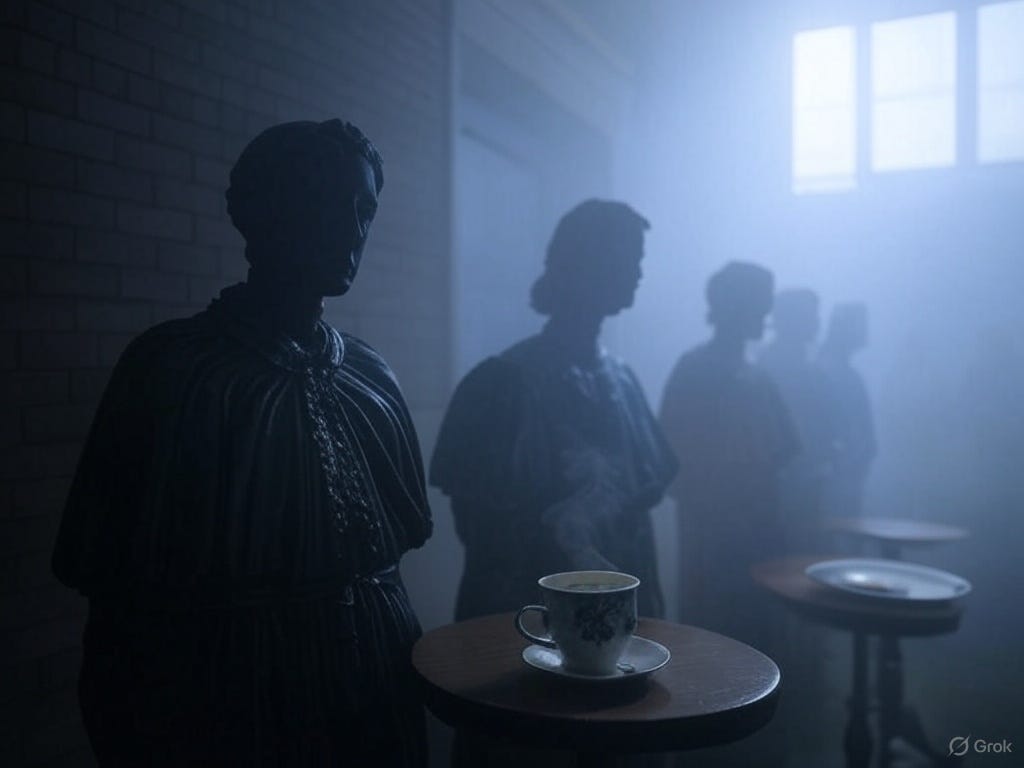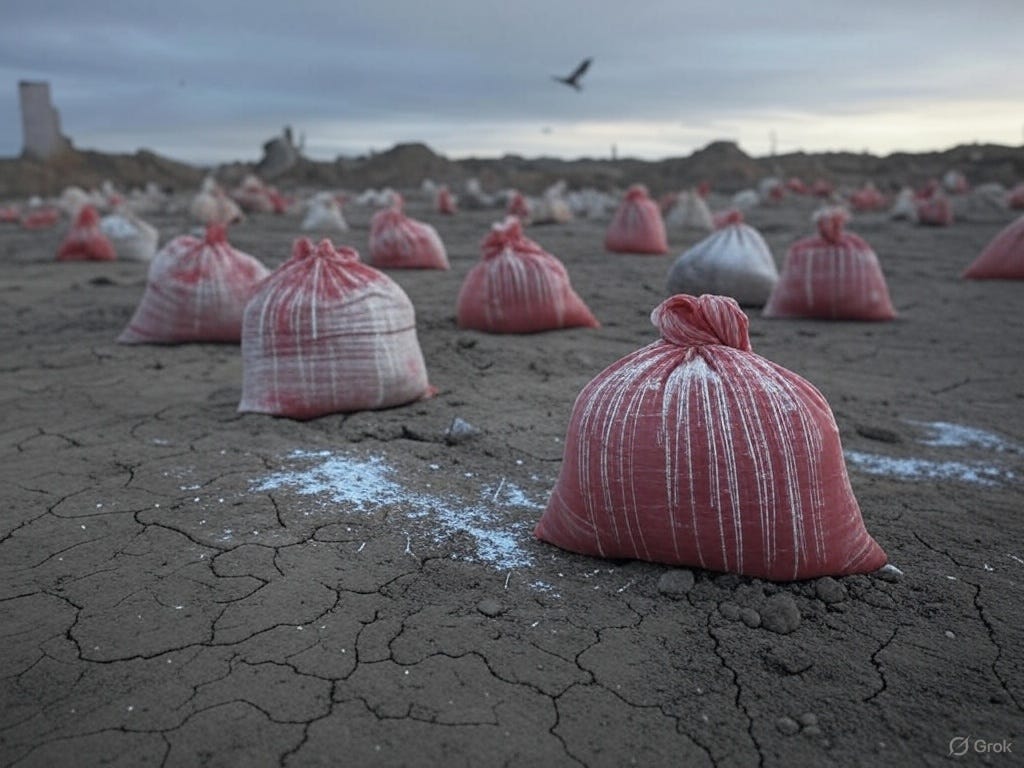The Gibbits of Academia are Growing
I was ranked #51 on humour on here, i don't think this is going to push me up the list.
If you believe in the importance of free speech, subscribe to support uncensored, fearless writing—the more people who pay, the more time I can devote to this. Free speech matters. I am a university professor suspended because of a free speech issue, so I am not speaking from the bleachers. The button below takes you to that story.
Please subscribe to receive at least three pieces /essays per week with open comments. It’s $6 per month, less than USD 4. Everyone says, "Hey, it’s just a cup of coffee," but please choose my coffee when you come to the Substack counter. Cheers.
In medieval towns, they strung up the condemned and recently dead in iron cages—gibbets; they called them—hoisted high above the gates, where the stench of rot and the cawing of crows preached a sermon to the living: Obey or this is your fate. Flesh peeled away; bones bleached under a pitiless sun, a warning carved in decay.
Today, the gibbet swings anew, not over city walls but within the marbled halls of universities—those once-sacred cloisters of thought now turned slaughterhouses, where the pursuit of truth dangles lifeless, and the souls who dared to chase it are left to rot in plain sight.
The deepest agony is not just the betrayal but the blinding hypocrisy: these administrative inquisitors and human rights bureaucrats strut in the stitched finery of moral superiority, preening in robes of justice while their cuffs drip with the blood and viscera of the very minds they’ve butchered.
Their hallways are abattoirs disguised as sanctuaries, yet no one dares say it aloud. Perhaps only I—and a few others who’ve not yet been sedated by jargon and fear—can still smell the carnage. It is good to show tenderness to the poor and the broken but to reserve rage for the hypocrites.
We should all scream at these well-dressed destroyers of learning and turn on them, chanting together, ‘Hypocrites!” ' “White-washed tombs!”
If credentialism and education, drained of the blood of learning, could be put in small brown wooden buckets, we should pour it on their fine suits, the horror of it ruining their fine clothes.
Their fat wallets would be filled with congealed blood, and all those cards from their latest educational trip would be stuck to the leather and irremovable.
They would stand there, now like bloody statues, and we might discover that is all they ever were, only moving, like the Weeping Angels on Doctor Who, when we blinked.
But now they would be shown on the outside what they are on the inside: horrid, ghastly visions, inhuman, their eyes gauping like a fish flopping on a boat deck.
These bloody statues, now, fit for nothing, their stench and unpleasantness so wretched they would be dragged out the door, blood red, covered with slices of torn flesh.
The stench would be unbearable.
Be rid of them.
They would be desperately ground up, their marble screeching in resistance. Still, we would push them hard into the grinder, hoping their memory would soon be forgotten.
As piles of red streaked chalk, we would see that their legacies crumbled as easily as their virtue.
Then we would throw the stinking bags in the dump, and even the crows would show no interest in these dusty, white, red-smeared bags holding the remains.
I write this with a weakened snarl, my voice trembling not with rage—though it simmers, banked for now—but with a grief so deep it chokes me.
I’ve seen the carnage, felt the cold iron of betrayal clamp around my neck and watched learning, that fragile, flickering flame. But now, snuffed out by the soulless machinery and the blankets of dust that fall, our poor candle has been lost to the falling dust of machinery of lucre.
Picture the classroom: a cavern of blank stares, where students scroll TikTok as a professor drones through PowerPoint slides he didn’t even craft—stolen from a publisher’s test bank, a hollow echo of someone else’s labour.
Once, this was a crucible of ideas, where minds clashed and sparked, where a teacher’s passion could ignite a student’s soul.
Now? It’s a conveyor belt, churning out credentials like sausages, the air thick with the reek of apathy. The students don’t hunger for wisdom—they crave answer keys before exams, believing this is normal, that learning is a transaction, not a transformation.
And the faculty? Some still fight, their voices hoarse from shouting into the void, but too many have surrendered, parroting the administration’s creed:
Fill the seats, inflate the grades, and keep the machine humming.
The humanities, my battered home, lie gutted—critical thinking unchanged from freshman year to cap and gown, a statistic so bleak it’s a dirge for the mind.
Then there’s the man who tried—who dared—to do good. Call him Professor X, a wraith stitched from the bones of the broken. He poured his life into literature for twenty years, weaving lectures that danced with Shakespeare’s ghosts and Dostoevsky’s despair. But when he dared to question the university’s grovelling to donors—those fat-wallets gods of the new academy—the gibbet creaked open.
A sham investigation, a chorus of silent colleagues, a suspension without cause—his name became a curse, his reputation a carcass swinging for all to see. “I thought they’d stand by me,” he mutters into his whiskey, alone in a town that once sang his praises.
He hates himself now, not for weakness, but for the fool’s morality that made him believe in loyalty. “The life of man is of no greater duration than the breath of his nostrils,” Plato warned, and X feels every exhale as a theft, his goodness a noose he tied himself.
Dr. Y, a biologist with hands scarred from a decade in the lab, fares no better. Replaced by a 25-year-old —cheaper, shinier, unburdened by experience—he protested, only to be buried under legal threats and bureaucratic sludge. His lectures and life’s work were swallowed into the university’s unpaid, unreturned digital maw.
The deepest agony is not just the betrayal but the blinding hypocrisy: these administrative inquisitors and human rights bureaucrats strut in the stitched finery of moral superiority, preening in robes of justice while their cuffs drip with the blood and viscera of the very minds they’ve butchered.
And Dr. C, the philosopher, whose union—cowardly as Pilate washing his hands—abandoned him to fabricated harassment claims. He fought alone and lost everything: his job, home, the will to breathe.
His suicide note, a final lecture, read, “They made me invisible.” The gibbet swung digital this time—gossip and defamation, his name a warning whispered in faculty lounges: Don’t care too much, or this is you.
Keep reading with a 7-day free trial
Subscribe to Freedom to Offend to keep reading this post and get 7 days of free access to the full post archives.








